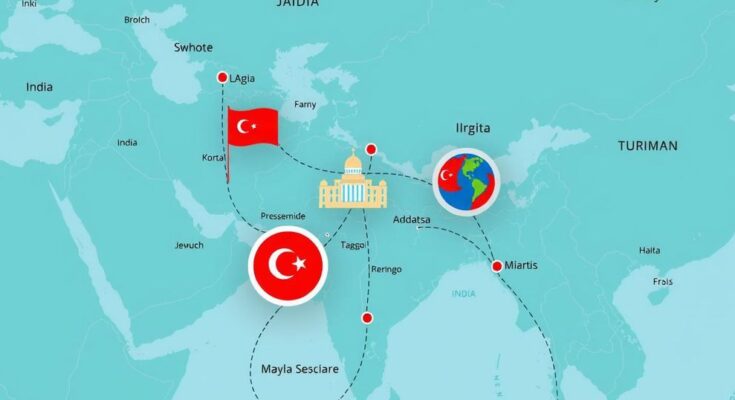Michael Rubin, a Middle East expert, discusses Turkey’s support for terrorism, particularly concerning Kashmir, and its implications for India. He highlights the challenges posed by Turkey-Pakistan relations and suggests increased support for the Kurdish movement as a counter-strategy. Rubin calls for India to adopt a more assertive diplomatic approach, emphasizing the declining influence of Turkey in the West and the growing recognition of its role as a sponsor of terrorism.
In an exclusive interview with IANS, Michael Rubin, a Middle East expert, discusses Turkey’s role in supporting terrorism, particularly regarding the Kashmir issue, and examines its implications for India. Rubin, a senior fellow at the American Enterprise Institute, draws from his extensive experiences in the region, providing insight into the geopolitical dynamics shaped by Turkey’s relationships with Pakistan and its stance on Kurdish rights.
Rubin emphasizes the complexities surrounding Abdullah Ocalan’s call for the PKK to disarm. He notes that Ocalan has been in solitary confinement since 1999, lacking real control over the PKK. Responses to his call for a ceasefire demonstrate skepticism within the PKK, with members insisting they will not lay down arms until Turkey ceases its military actions. This sentiment reflects distrust and previous failures of peace agreements in 2012 and 2015, leading to a fragmented leadership and ongoing resistance.
On India’s geopolitical considerations, Rubin asserts that the Turkish-Pakistani alliance poses significant challenges. He suggests that India should support the Kurdish movement as a strategic counterbalance, potentially mitigating Turkey’s influence in Kashmir. He articulates that Turkish President Recep Tayyip Erdogan’s ideological firm stance on supporting terrorism must be confronted, asserting that action must be taken to counter any involvement in Kashmir.
Rubin criticizes India’s diplomatic approach, urging it to adopt a more assertive strategy. He asserts that as the largest democracy, India should not hesitate to respond decisively to terrorism and states, “India has to stop being polite.” Enhancing its geopolitical stance could require direct responses to Turkey’s actions in Kashmir.
In considering the West’s perspective on Turkey’s role among Islamists, Rubin highlights uncertainty regarding the U.S. and Europe’s positions, especially under potential leadership changes. Turkey’s support of groups such as Hamas complicates relations, especially amid fluctuating U.S. sentiments toward Erdogan. Rubin underscores that historically, support for Turkey is waning in Congress, with a growing consensus viewing Turkey as a terror-supporting state.
Rubin concludes that there is a need for a reevaluation of Turkey’s role and actions in the broader context of terrorism. The perception of Turkey as a state sponsor of terrorism has gained traction, suggesting that both diplomatic dialogue and strategic action are crucial for India and its allies facing Turkish aggression.
The complexities surrounding Turkey’s geopolitical actions, particularly its support for terrorism and its alliance with Pakistan, demand a robust response from India. Michael Rubin’s insights highlight the need for India to adopt a firmer diplomatic stance. Enhancing support for the Kurdish movement may serve as a strategic counterbalance against Turkey. Moreover, the declining influence of Turkey within Western contexts suggests potential shifts in international relations that India could leverage to bolster its national interests.
Original Source: www.thehansindia.com




